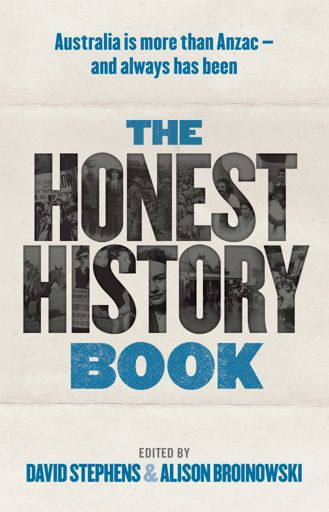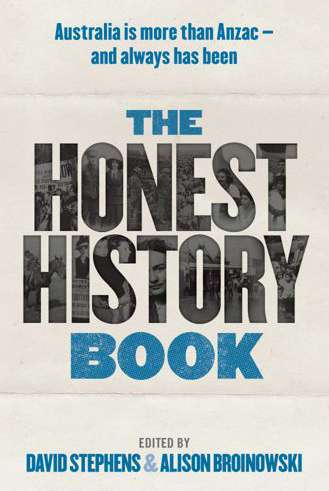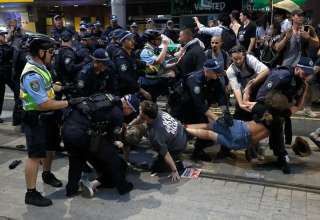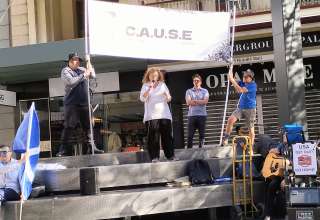This article came from The Honest History website
 Australia is more than Anzac – and always has been
Australia is more than Anzac – and always has been
David Stephens and Alison Broinowski (eds) The Honest History Book New South 2017 PB 344pp $34.99
What the book is about
The Honest History Book is collective history written by 19 authors. It is an argument about Australia’s past, present and future (‘Australia is more than Anzac – and always has been’) and about the difference between history and myth (honest history is interpretation robustly supported by evidence, myth lacks evidence or distorts it). These are themes that the Honest History coalition and website have pursued for more than three years.
Honest History has argued that, while war is important in Australian history, so are many other themes. Hence our mantra: ‘not only Anzac but also’. In other words, ‘Australia is more than Anzac – and always has been’. Some parts of Australian history have not received sufficient emphasis; there have also been some silences. ‘Anzackery’ (defined in the Australian National Dictionary as ‘the promotion of the Anzac legend in ways that are perceived to be excessive or misguided’) has sometimes drowned out other voices. The book presents evidence to redress the balance.
The book is published by NewSouth and is available in bookshops, for order online, and as an e-book (see links below). It is edited by David Stephens and Alison Broinowski with a foreword by Julianne Schultz.
The authors are Paul Daley, Mark McKenna, Peter Stanley, Carolyn Holbrook, Mark Dapin, Carmen Lawrence, Stuart Macintyre, Frank Bongiorno, Larissa Behrendt, Douglas Newton, Joy Damousi, Gwenda Tavan, Michael Piggott, Burçin Çakır, Vicken Babkenian, Judith Crispin, Rebecca Jones, David Stephens and Alison Broinowski.
Part I of the book: Putting Anzac in its place
This part has chapters by Douglas Newton on Australia’s Great War in a world context, Vicken Babkenian and Judith Crispin on Australia’s Armenian story, Carolyn Holbrook on Anzac, past, present and future, and Michael Piggott on why the Australian War Memorial needs to get over Charles Bean. Then, Mark Dapin destroys some myths about the treatment of Vietnam veterans and David Stephens and Burçin Çakır expose the ‘Atatürk words’ confidence trick. Frank Bongiorno asks whether politicians will ever forsake the political advantages of Anzac and David Stephens argues for rescuing a quieter, peaceful Anzac from beneath the sludge of Anzackery.
Part II of the book: Australian stories and silences
Here we have Rebecca Jones looking at how the environment has influenced Australian history, Gwenda Tavan on our ambivalent attitudes to immigration and multiculturalism and Stuart Macintyre on whether we have learned economic lessons from bust and boom. Carmen Lawrence compares the Australian myth of egalitarianism with the reality of increasing inequality while Peter Stanley pursues the contradiction in the military arena between this same myth and our idolisation of Victoria Cross recipients and Sir John Monash.
The ‘silences’ of Australian history feature in Joy Damousi’s chapter on the insufficiently recognised potential of leadership by women and in Larissa Behrendt’s contribution on how the story we tell ourselves has still not dealt with the 1788 invasion moment and its consequences for Indigenous Australians and all of us. Paul Daley then asks why frontier conflict has been glossed over in our mostly Anglo-Celtic presentation of history.
Finally, Mark McKenna wonders whether Anzac, with its inbuilt monarchical element – ‘King and Country’ – threatens our capacity to ever become a republic and Alison Broinowski describes Australia’s continuing tug of war between militarism and independence. The editors provide a brief conclusion, including some policy suggestions.
The Honest History Book can be purchased at Dymocks (all states), Readings (Vic), Gleebooks (NSW), and Angus and Robertson and Booktopia (both online)





